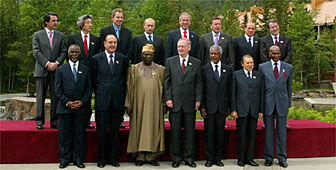Swiss NGOs say G8 Africa plan fails to deliver

Swiss groups have joined an international chorus of criticism saying G8 proposals to support an aid action plan for Africa do not go far enough.
The claims come after leaders of the world’s eight most powerful industrialised nations this week signed an agreement with four African heads of state to promote economic and political development on the continent.
Dieter Imhof, director of cooperation at Swissaid – a Bern-based non-governmental organisation (NGO) – said the G8 summit agreement amounted to nothing more than a political proclamation.
“There’s very little new in the promise,” he told swissinfo. “I think African leaders expected more and I don’t think they will be satisfied with what has been pledged.”
Trade and debt
Imhof said development aid in itself was not the solution to Africa’s problems and the G8 summit had not gone far enough in addressing trade and debt issues.
“There will be no real benefits unless trade regulations are eased for Africa,” he said.
“What African countries are asking for first and foremost is debt relief, and if they don’t get it, any extra aid money is likely to go towards the repayment of debts.”
François Meienberg of the Bern Declaration – another Swiss NGO – agrees that trade is an important issue which needs to be addressed. But he also says the gap between wealthier nations and the developing countries of Africa is proof of an imbalance of power in the world.
“It’s all right to link aid and development to good governance,” he said.
“But the whole system of how global agreements are reached needs to be changed so that developing countries have more negotiating power.”
Foreign investment
The G8 Africa Action Plan offers billions of dollars in new aid to African countries in return for promises of democracy and good governance.
It is an endorsement of the New Partnership for Africa’s Development, initiated by African leaders, and is based on the idea that foreign investment will help encourage development more than international aid.
Africa currently receives less than one per cent of the world’s foreign investment, while United Nations statistics suggest development aid to Africa has fallen 43 per cent in the last decade.
The continent received just $16.4 billion in development aid in 2000 compared to $24.2 billion in 1990.
“It is part of a trend,” said Christoph Stückelberger, the general secretary of Bread for All, a Swiss NGO active in the field of development.
“This needs to be reversed because trade and debt reduction cannot tackle Africa’s problems without an emphasis also being placed on development aid,” he added.
Stückelberger sees the G8 plan as a step in the right direction, putting Africa at the top of the agenda and sending out a message to the world that the continent is an important part of the international community.
“But the commitment to debt reduction was not enough,” he told swissinfo.
“Industrialised countries have $350 billion a year to subsidise their agriculture and that makes the $1 billion for debt reduction in Africa look ridiculous.”
Swiss aid to Africa
Switzerland has bucked the general trend of drastically reducing the amount of money it spends on development aid.
Despite a decrease in the direct funding of projects in Africa last year, Adrian Schlatpfer of the Swiss Agency for Development and Cooperation (SDC) said there were always fluctuations from one year to the next.
“In absolute terms there hasn’t been a reduction in our aid to Africa and it still receives the lion’s share of Swiss development cooperation abroad – 41 per cent,” he said.
Schlatpfer says Switzerland is facing the same problem as many other countries. Funding and financial resources are limited, but the SDC’s commitment to several countries in Africa remains as strong as ever.
“Switzerland’s development policy in Africa and the rest of the world is oriented towards the alleviation of poverty,” he commented. “And our asset has always been to work closely with local partners.”
Funding is allocated according to local needs and the perceived potential of individual projects. The expertise Switzerland is able to provide and the political interests of Swiss foreign policy also play a role.
But Christoph Stückelberger maintains that one of the strengths of Switzerland’s official development aid programme in Africa has always been its openness.
“Swiss development aid doesn’t carry with it political conditions,” he said. “It’s mostly linked to the needs of the partners and not primarily motivated by Swiss foreign policy goals and objectives.”
by Jonathan Summerton

In compliance with the JTI standards
More: SWI swissinfo.ch certified by the Journalism Trust Initiative
You can find an overview of ongoing debates with our journalists here . Please join us!
If you want to start a conversation about a topic raised in this article or want to report factual errors, email us at english@swissinfo.ch.